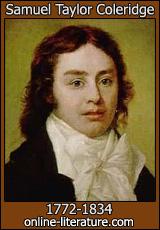Samuel Taylor Coleridge: A Brief Biography
 Samuel Taylor Coleridge was born October 21, 1772, at Ottery St. Mary's, Devonshire, the youngest of 14 children. His father, John Coleridge, the parish vicar, died in 1781 just before Coleridge's ninth birthday. He was then sent to a boarding school, Christ's Hospital, as a charity scholar. A brilliant student, he went up to Jesus College, Cambridge, in 1791, on a small allowance provided by his brother George. Although he won a college medal in his first year for a long poem in Greek and was one of four finalists for a scholarship in his second, he was at the same time going through an adolescent crisis, experimenting with alcohol, opium, and sex, and falling in love with Mary Evans, the sister of a friend
Samuel Taylor Coleridge was born October 21, 1772, at Ottery St. Mary's, Devonshire, the youngest of 14 children. His father, John Coleridge, the parish vicar, died in 1781 just before Coleridge's ninth birthday. He was then sent to a boarding school, Christ's Hospital, as a charity scholar. A brilliant student, he went up to Jesus College, Cambridge, in 1791, on a small allowance provided by his brother George. Although he won a college medal in his first year for a long poem in Greek and was one of four finalists for a scholarship in his second, he was at the same time going through an adolescent crisis, experimenting with alcohol, opium, and sex, and falling in love with Mary Evans, the sister of a friend In December 1793 he left school and joined the Dragoons (under the alias Silas Tomkyn Comerbacke), but kept falling off his horse. By the following April his brothers had found out where he was, bailed him out, and convinced him to return to Cambridge. That summer (1794) he left school again and met the poet Robert Southey, with whom he planned a utopian "Pantisocracy" to be established on the banks of the Susquehanna. The plan required that each participant be married, and Southey married Edith Fricker and Coleridge married her younger sister Sara. When the plans for the Pantisocracy fell through, the two of them were trapped in an uncongenial marriage.
By now Coleridge, who was earning his keep partly as a Unitarian preacher, had begun seriously to write poetry. He became close friends to William Wordsworth and his sister Dorothy, who moved to Alfoxden in 1797 to be near the Coleridges at Nether Stowey, and the two poets planned Lyrical Ballads, which appeared in 1798. Coleridge's most important contribution was "The Rime of the Ancient Mariner." That same September the three of them visited Germany, a visit much more important to Coleridge than to Wordsworth. In Germany, Coleridge discovered Kant, Schiller, Schelling, A.W. Schlegel, and he came back to England imbued with the spirit of German Romantic thought.
In 1799 Coleridge joined the Wordsworths, who were staying at the Hutchinson farm in Durham. Wordsworth was waiting for an inheritance to be settled so he could wed Mary Hutchinson; and Coleridge fell in love with her sister Sara, who appears in his journals and poems as "Asra."
From the time of his marriage on, Coleridge was searching for a vocation that would pay the rent, although the annuity of £150 from the Wedgwoods eased these concerns after 1798 and meant that he did not need to take up a career as a Unitarian minister. It is interesting to speculate if he would have later returned to the Church of England without that timely annuity (see "Coleridge's religion").
Perhaps because he conceived such grand projects, he had difficulty carrying them through to completion, and he berated himself for his "indolence." It is unclear whether his growing use of opium was a symptom or a cause of his growing depression. "Dejection: An Ode," written in 1802, expresses his despair at the loss of his creative powers. In 1804 he travelled to Sicily and Malta, working for a time as Acting Public Secretary of Malta under the Commissioner, Alexander Ball. He gave this up and returned to England in 1806; Dorothy Wordsworth was shocked at his condition upon his return. His opium addiction (he was using as much as two quarts of laudanum a week) now began to take over his life: he separated from his wife in 1808, quarrelled with Wordworth in 1810, lost part of his annuity in 1811, put himself under the care of Dr. Daniel in 1814, and finally moved in with Dr. Gilman in Highgate, London, where the doctor and his family managed for the next 18 years to keep his demon under control.
At this same time he was establishing himself as the most intellectual of the English Romantics, delivering an influential series of lectures on Shakespeare in the winter of 1811-12 and bringing out his Biographia Literaria in 1817. Among his contemporaries, he was best known as a talker, in the tradition of Samuel Johnson: his "Highgate Thursdays" became famous. He died July 25, 1834.






 رد مع اقتباس
رد مع اقتباس